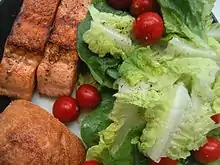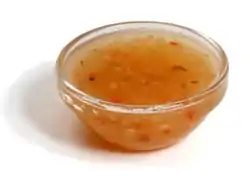Salad
A salad is a dish consisting of mixed pieces of food, sometimes with at least one raw ingredient. It is often dressed, and is typically served at room temperature or chilled, though some can be served warm.
 A garden salad consisting of lettuce, cucumber, scallions, cherry tomatoes, olives, sun-dried tomatoes, and feta | |
| Main ingredients | Pieces of vegetables, fruits, meat, eggs, or grains mixed with a sauce. |
|---|---|
| Variations | Many |
Garden salads use a base of leafy greens such as lettuce, arugula/rocket, kale or spinach; they are common enough that the word salad alone often refers specifically to garden salads. Other types include bean salad, tuna salad, fattoush, Greek salad (vegetable-based, but without leafy greens), and sōmen salad (a noodle-based salad). The sauce used to flavor a salad is generally called a salad dressing; most salad dressings are based on either a mixture of oil and vinegar or a fermented milk product like kefir.
Salads may be served at any point during a meal:
- Appetizer salads—light, smaller-portion salads served as the first course of the meal.
- Side salads—to accompany the main course as a side dish, examples include potato salad and Caesar salad.
- Main course salads—usually containing a portion of a high-protein foods, such as meat, fish, eggs, legumes, or cheese.
- Dessert salads—sweet versions containing fruit, gelatin, sweeteners or whipped cream.
Etymology

The word "salad" comes to English from the French salade of the same meaning, itself an abbreviated form of the earlier Vulgar Latin herba salata (salted greens), from the Latin salata (salted), from sal (salt). In English, the word first appears as "salad" or "sallet" in the 14th century. Salt is associated with salad because vegetables were seasoned with brine (a solution of salt in water) or salty oil-and-vinegar dressings during Roman times.[1] The phrase "salad days", meaning a "time of youthful inexperience" (based on the notion of "green"), is first recorded by Shakespeare in 1606,[1] while the use of salad bar, referring to a buffet-style serving of salad ingredients, first appeared in American English in the 1960s.
History
The Romans, ancient Greeks and Persians ate mixed greens with dressing, a type of mixed salad.[2][3] Salads, including layered and dressed salads, have been popular in Europe since the Greek and Roman imperial expansions. In his 1699 book, Acetaria: A Discourse on Sallets,[4] John Evelyn attempted with little success to encourage his fellow Britons to eat fresh salad greens.[5] Mary, Queen of Scots, ate boiled celery root over greens covered with creamy mustard dressing, truffles, chervil, and slices of hard-boiled eggs. (Citation needed)
Oil used on salads can be found in the 17th-century colony of New Netherland (later called New York, New Jersey and Delaware). A list of common items arriving on ships and their designated prices when appraising cargo included "a can of salad oil at 1.10 florins" and "an anker of wine vinegar at 16 florins".[6] In a 1665 letter to the Director of New Netherland from the Island of Curaçao there is a request to send greens: "I request most amicably that your honors be pleased to send me seed of every sort, such as cabbage, carrots, lettuce, parsley, etc. for none can be acquired here and I know that your honor has plenty,...".[7]
Salads may be sold in supermarkets, at restaurants and at fast food chains. In the United States, restaurants will often have a salad bar with salad-making ingredients, which the customers will use to put together their salad.[8] Salad restaurants were earning more than $300 million in 2014.[9] At-home salad consumption in the 2010s was rising but moving away from fresh-chopped lettuce and toward bagged greens and salad kits, with bag sales expected to reach $7 billion per year.[10]
Types of salads
A salad can be a composed salad (with the ingredients specifically arranged on the serving dish) or a tossed salad (with the ingredients placed in a bowl and mixed). An antipasto plate, the first dish of a formal Italian meal, is similar to a composed salad, and has vegetables, cheese, and meat.
Green salad

A green salad or garden salad is most often composed of leafy vegetables such as lettuce varieties, spinach, or rocket (arugula). If non-greens make up a large portion of the salad it may instead be called a vegetable salad. Common raw vegetables (in the culinary sense) used in a salad include cucumbers, peppers, tomatoes, onions, carrots, celery, radishes, mushrooms, avocado, olives, artichoke hearts, heart of palm, watercress, parsley, garden beets, and green beans. Nuts, berries, seeds, and flowers are less common components. Hard-boiled eggs, bacon, shrimp, and cheeses may be used as garnishes, but large amounts of animal-based foods would be more likely in a dinner salad.
Wedge salad
A wedge salad is a green salad made from a head of lettuce (often iceberg), halved or quartered, with other ingredients on top.[11]
Fruit salads

Fruit salads are made of fruit (in the culinary sense), which may be fresh or canned. Examples include fruit cocktail.[12]
Rice and pasta salads
Rice and pasta may be used as the key ingredient to making a salad. Some examples of rice salads come from Thai cuisine, like Nasi ulam.
Bound salads

Bound salads are assembled with thick sauces such as mayonnaise. One portion of a bound salad will hold its shape when placed on a plate with a scoop. Examples of bound salad include tuna salad, chicken salad, egg salad, coleslaw, and potato salad. Some bound salads are used as sandwich fillings. Some pasta salads, e.g. macaroni salad, are bound salads. They are popular at picnics and barbecues.
Dinner salads

Main course salads (known as dinner salads[12] or as entrée salads in the United States) may contain small pieces of poultry, seafood, or steak. Caesar salad, Chef salad, Cobb salad, Chinese chicken salad and Michigan salad are dinner salads.
A wide variety of cheeses are used in dinner salads, including Roquefort blue cheese (traditional for a Cobb salad), and Swiss, Cheddar, Jack, and Provolone (for Chef and Cobb salads).
Dessert salads

Dessert salads rarely include leafy greens and are often sweet. Common variants are made with gelatin or whipped cream; e.g. jello salad, pistachio salad, and ambrosia. Other forms of dessert salads include Snickers salad, glorified rice, and cookie salad.[12]
Dressings

Sauces for salads are called dressings.
In Western culture, there are two basic types of salad dressing:
- Vinaigrettes based on a mixture (emulsion) of salad oil and vinegar, often flavored with herbs, spices, salt, pepper, sugar, and other ingredients.[13]
- Creamy dressings, usually based on mayonnaise or fermented milk products, such as yogurt, sour cream (crème fraîche, smetana), or buttermilk.
In the United States, buttermilk-based ranch dressing is most popular, with vinaigrettes and Caesar-style dressing following close behind.[14] Traditional dressings in France are vinaigrettes, typically mustard-based, while sour cream (Smetana) and mayonnaise are predominant in Central Europe, Eastern Europe and Russia. In Denmark, dressings are often based on crème fraîche. In southern Europe and the eastern Mediterranean, salad is generally dressed by the diner with olive oil and vinegar. In Asia, it is common to add sesame oil, fish sauce, citrus juice, or soy sauce to salad dressings. Other condiments sometimes used as salad dressing include lemon juice, lime juice, and pumpkin seed oil.
Other salad dressings include:
Salad records
On 4 September 2016, the largest recorded salad, weighing 20,100 kilograms (44,300 lb), was created in Red Square, Moscow, Russia, by Mouzenidis Travel. It was a Greek salad consisting of tomatoes, cucumbers, onions, olives, feta cheese, olive oil, oregano and salt.[15]
See also
References
- Harper, Douglas. "salad". Online Etymology Dictionary.
- Olver, Lynne. "The Food Timeline: history notes--salad". The Food Timeline.
- "salad-recipe.net". Archived from the original on 3 November 2005.
- "A Discourse of Sallets-Free Ebook".
- "The History of Salad". ChefTalk.com. 17 February 2010. Archived from the original on 5 June 2009. Retrieved 20 October 2009.
- "Council Minutes page 78" (PDF).
- "Curaçao Papers page 234" (PDF).
- "Birth of the salad bar; Local restaurant owners may have invented the common buffet," The State Journal-Register (Springfield, IL), 28 December 2001, Magazine section (p. 10A)
- Lam, Bourree (3 July 2015). "America's $300 Million Salad Industry". The Atlantic. Retrieved 3 July 2015.
- "As Bagged Salad Kits Boom, Americans Eat More Greens".
- Paula Deen. "Wedge Salad". Food Network. Retrieved 25 January 2016.
- Melissa Barlow, Stephanie Ashcraft. Things to Do with a Salad: One Hundred One Things to Do With a Salad. Gibbs Smith, 2006. ISBN 1-4236-0013-4. 128 pages, page 7.
- "Vinaigrette". BBC Good Food.
- "Top Ten Most Popular Salad Dressing Flavors". The Food Channel®.
- "Largest salad". Guinness World Records. Retrieved 14 November 2017.
.jpg.webp)